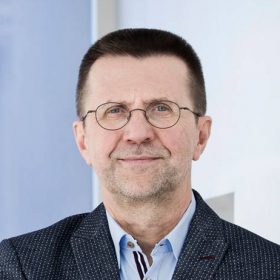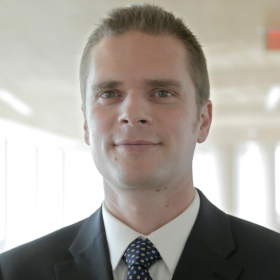The attendance certificates are available upon request.
The next CRISPR meeting will be held in Québec city (Canada) on June 17-20, 2019.
| 07:45-08:45 | Registration |
| 08:45-09:00 | Welcome address |
| 09:00-10:00 |
Keynote talk: Feng Zhang, MIT Advances in genome editing technologies |
| 10:00-10:30 |
Eugene Koonin, NIH/NCBI Origin and evolution of CRISPR-Cas systems |
| 10:30-11:10 | Coffee break |
| Class 1 systems | |
| Chair: John van der Oost | |
| 11:10-11:40 |
Blake Wiedenheft, Montana State University dsDNA unwinding is a necessary signal for Cas3 activation |
| 11:40-12:00 |
Ralf Seidel, Universität Leipzig A kinetic model for the off-target recognition by Cascade |
| 12:00-12:20 |
Joachim Vink, TU Delft Direct visualization of CRISPR target search in live bacteria |
| 12:20-12:40 |
Rodolphe Barrangou, NC State University Characterization and applications of Type I CRISPR-Cas systems in bacteria and beyond |
| 12:40-13:00 |
Paul Donohoue, Caribou Biosciences, Inc. Enabling Genome Engineering in Human Cells with the Type I CRISPR-Cas System |
| 13:00-14:20 | Lunch |
| Chair: Erik Sontheimer | |
| 14:20-14:50 |
Martin Jinek, University of Zurich Structural and mechanistic insights into type III-A and type V-A systems |
| 14:50-15:10 |
Tina Y. Liu, University of California, Berkeley Recruitment of the Type III-A Csm complex to transcriptionally active DNA by RNA-guided RNA recognition |
| 15:10-15:30 |
Yanli Wang, Institute of Biophysics, Chinese Academy of Sciences Structural studies of Type III-A CRISPR-Cas system |
| 15:30-15:50 |
Nora Pyenson, Rockefeller University Broad Targeting Specificity during Type III Immunity Constrains Viral Escape |
| 15:50-16:30 | Coffee break |
| Chair: Dipali Sashital | |
| 16:30-17:00 |
Kira S. Makarova, NIH/NCBI Beyond the adaptive immunity: sub- and neofunctionalization of CRISPR-Cas systems and their components |
| 17:00-17:30 |
Peter Fineran, University of Otago CRISPR-Cas-mediated phage resistance enhances horizontal gene transfer by transduction |
| 17:30-17:50 |
Lennart Randau, Max Planck Institute for Terrestrial Microbiology The Type IV crRNP surveillance complex of Aromatoleum aromaticum |
| Poster session I | |
| 17:50-19:50 | Poster session (odd numbers) |
| 20:00 20:20 |
Conference dinner Promoting diversity discussion panel with Rachel Haurwitz, Karen Maxwell, and Dipali Sashital |
| Class 2 systems | |
| Chair: Michael Terns | |
| 09:00-09:30 |
John van der Oost, Wageningen University DNA targeting by CRISPR Class 2 nucleases |
| 09:30-09:50 |
Daan Swarts, University of Zurich Structural insights into the mechanism of DNA cleavage by CRISPR-Cas12a/Cpf1 |
| 09:50-10:10 |
Ilya Finkelstein, University of Texas at Austin A molecular basis for the extraordinary specificity of Cas12a (Cpf1) |
| 10:10-10:30 |
David Scott, Arbor Biotechnologies Discovery of Type VI-D CRISPR-Cas Systems |
| 10:30-10:50 |
Guilhem Faure, NIH/NLM/NCBI ncRNAs in Class 2 CRISPR-Cas systems: CRISPR array as an antirepeat generator |
| 10:50-11:30 | Coffee break |
| Chair: Blake Wiedenheft | |
| 11:30-12:00 |
Osamu Nureki, University of Tokyo Molecular mechanism of CRISPR and structure-based development of genome editing tool towards medical applications |
| 12:00-12:30 |
Scott Bailey, Johns Hopkins University Real-time observation of DNA target interrogation and cleavage by engineered Cas9s and Cas12a |
| 12:30-12:50 |
Hiroshi Nishimasu, University of Tokyo Engineered CRISPR-Cas9 recognizing a single guanine PAM |
| 12:50-13:10 |
Virginijus Siksnys, Vilnius University Exploring Cas9 diversity |
| 13:10-14:30 | Lunch |
| Chair: Karen Maxwell | |
| Genome editing with Class 2 systems | |
| 14:30-15:00 |
Rachel Haurwitz, Caribou Biosciences Enabling Precision Editing with CRISPR Hybrid RNA-DNA Guided Cas9 |
| 15:00-15:30 |
Erik Sontheimer, University of Massachusetts Medical School Enhancing genome editing by chemical modification of guides and donors |
| 15:30-15:50 |
Mollie Schubert, Integrated DNA Technologies A novel Cas9 mutant confers reduced off-target gene editing while maintaining on-target potency |
| 15:50-16:30 | Coffee break |
| Chair: Rotem Sorek | |
| 16:30-17:00 |
Barrett Steinberg, Editas Identification of guide-intrinsic determinants of Cas9 |
| 17:00-17:20 |
Akihiko Kondo, Kobe University Genome editing with base editing systems from bacteria to plants |
| 17:20-17:40 |
Ian Jepson, Syngenta New crop breeding approaches using CRISPR Cas9 editing |
| 17:40-18:00 |
Mark Cigan, Genus plc Gene editing to tackle diseases in livestock |
| Poster session II | |
| 18:00-20:00 | Poster session (even numbers) |
| 20:00 | Free evening in Vilnius |
| Anti-CRISPR | |
| 08:40-09:10 |
Karen L. Maxwell, University of Toronto Inhibition of Type II-C CRISPR-Cas Systems by anti-CRISPR Proteins |
| 09:10-09:40 |
Sylvain Moineau, Laval University Type II-A anti-CRISPRs are widespread in virulent phages infecting Streptococcus thermophilus |
| 09:40-10:00 |
Adeline Goulet, CNRS Mechanistic insights into the activity of anti-CRISPR proteins from virulent streptococcal phages |
| 10:00-10:20 |
Adair Borges, UCSF Bacteriophage cooperation suppresses CRISPR-Cas3 and Cas9 immunity |
| 10:20-11:00 | Coffee break |
| CRISPR technology – gene regulation | |
| Chair: Rachel Haurwitz | |
| 11:00-11:20 |
Patrick Hsu, Salk Institute for Biological Studies Transcriptome engineering with RNA-targeting type VI-D CRISPR effectors |
| 11:20-11:40 |
Emily Anderson, Horizon Discovery Potent transcriptional activation using CRISPRa and synthetic crRNA:tracrRNA |
| 11:40-12:00 |
David Bikard, Institut Pasteur Silencing genes with dCas9: a story of fine-tuned control, high-throughput screens and surprising toxicity |
| CRISPR technology – diagnostics | |
| 12:00-12:20 |
Omar Abudayyeh, Broad Institute/Harvard/MIT Multiplexed and portable nucleic acid detection platform with Cas13, Cas12a, and Csm6 |
| 12:20-12:40 |
Janice Chen, UC Berkeley DETECTR: how Cas12a (Cpf1) mysteries led to a DNA detection platform |
| 12:40-14:00 | Lunch |
| Adaptation | |
| Chair: Sylvain Moineau | |
| 14:00-14:30 |
Ailong Ke, Cornell University Spacer acquisition mechanism in type II-A CRISPR system |
| 14:30-14:55 |
Dipali Sashital, Iowa State University Cas4-dependent prespacer processing ensures high-fidelity programming of CRISPR arrays |
| 14:55-15:20 |
Michael Terns, University of Georgia Cas4 nucleases define the PAM, length, and orientation of DNA fragments integrated at CRISPR loci |
| 15:20-15:45 |
Stan Brouns, Delft University of Technology On the role of Cas4 in CRISPR adaptation |
| 15:45-16:25 | Coffee break |
| Chair: Malcolm White | |
| 16:25-16:45 |
Ville Hoikkala, University of Jyvaskyla Phage-induced spacer acquisition in type VI-B and II-C CRISPR loci of the native host Flavobacterium columnare |
| 16:45-17:15 |
Konstantin Severinov, Rutgers University Detection of priming adaptation intermediates in vitro |
| Beyond CRISPR | |
| 17:15-17:45 |
Rotem Sorek, Weizmann Institute of Science New defense systems protecting bacteria from phage infection |
| 17:45-18:00 | Concluding remarks |
| 18:30 19:00 |
Conference Gala dinner Meet the editors discussion panel with April Pawluk (Cell), John Pham (Mol Cell), Steve Mao (Science), Angela Eggleston (Nature), Claudio Nunes Alves (Nat Micro), and Kevin Davies (CRISPRj) |
| 9:15-16:00 |
Conference tour to Trakai (optional, by reservation only) The buses will depart (9:15) and return (16:00) to the conference venue. The tour will include outdoor activities, so please make sure to have suitable footwear and protection against the unpredictable rain. |
|
The conference fee includes access to the conference, its materials, lunches and the conference dinner on Friday (but NOT accommodations or the Saturday trip to Trakai).
The registration is closed. Please make sure to have paid the registration fee.
Cancellation policy
A 50 Euros administration fee will be charged for cancellations with notice prior to May 20th, and the remainder of the deposit will be refunded. Regrettably, no refunds will be provided to cancellations within 30 days of the meeting, but registration may be transferred to other individuals with proper notice to the organizers.
Social program
Scientific proceedings will wrap up on Friday, and the conference Gala dinner will take place on Friday evening.
Conference dinner on both 20th and 22nd are included in the conference fee.
On Saturday, we offer an optional excursion to the historical city Trakai (30-45 min ride from the conference venue), where the picturesque Lithuanian natural landscape blends with ancient castles and a traditionally charming city. We will have the opportunity to experiment with traditional craftsmanship, and enjoy the various tastes of the Lithuanian food. An experienced guide will accompany us, and provide historical and cultural insights throughout our journey. The buses depart from the conference venue at 9:15 and we expect to be back in Vilnius at 16.00.
During the tour, we will spend quite a lot of time in open air. Given the ever unpredictable weather in Lithuania, please make sure to have a raincoat or umbrella and footwear suitable for outdoor activities.
“Hotel Radisson Blue Lietuva”, Konstitucijos pr. 20, LT-09308 Vilnius Lithuania
We invite you to visit Vilnius, the capital city of Lithuania, and enjoy the beautiful sceneries and unique soul it has to offer. Situated on the boundary between two ancient – Latin and Byzantine – civilisations, Vilnius remains an interesting blend of various cultures.
Here you can find almost all styles of the European architecture on display. The most dominant style is baroque. Its exceptional historical and architectural features earned World Heritage Site title from UNESCO in 1994. The conference venue is located just a 15 minute walk from the Vilnius Old Town, so you will have plenty of opportunities to admire it.
Vilnius is a green city: parks, public gardens, reserves and other green areas cover nearly half of the city area. Vilnius has a wide selection of restaurants. National dishes are often potato-based; for example, “zeppelins” are balloon-shaped potato cakes filled with meat. Lithuanian beer is widely considered to be some of the best in the world.
Read more at www.vilnius-tourism.lt
From Vilnius Airport (VNO) you can take bus number 3G and ride for ~25 min; the venue is located just 100m away from the 8th stop (called “Europos aikštė“). The 3G bus arrives every 5-10 min. If you are staying elsewhere, you can try to find a suitable bus here. You can buy a one-time ticket from the bus driver for 1 € or buy a special card (“Vilniečio kortelė“) for a long-term ticket from the local kiosks. Do not forget to mark or activate your ticket upon boarding the bus!
Alternatively, you can take a 15 min taxi drive for up to 10 €.
The official currency in Lithuania is euro. Visa and MasterCard are accepted in most (but not all) shops, hotels, and restaurants. However, cash-points are rather easily found in Vilnius.
Electricity in Lithuania is 220 Volts. Plugs are European standard with two round pins.
Generally, visas are not required for visiting Lithuania for less than 90 days. You can check if you have to acquire a Lithuanian visa by following this link.
June is usually warm in Vilnius but a jacket for cooler evenings and especially umbrella for a frequent rain are recommended.
Lithuania is a small country, so you can easily tour around and see it’s treasures.
Take a Culture Trip, ask Trip Advisor, or visit a local office.

Vilnius University, Lithuania

DuPont Nutrition and Health, France

North Carolina State University, USA
If you have any questions regarding the CRISPR 2018 Meeting, feel free to e-mail us at ![]() CRISPR2018Vilnius@gmail.com
CRISPR2018Vilnius@gmail.com
Follow us on Twitter ![]() @CRISPR2018
@CRISPR2018
Please use #CRISPR2018 when tweeting about the event.